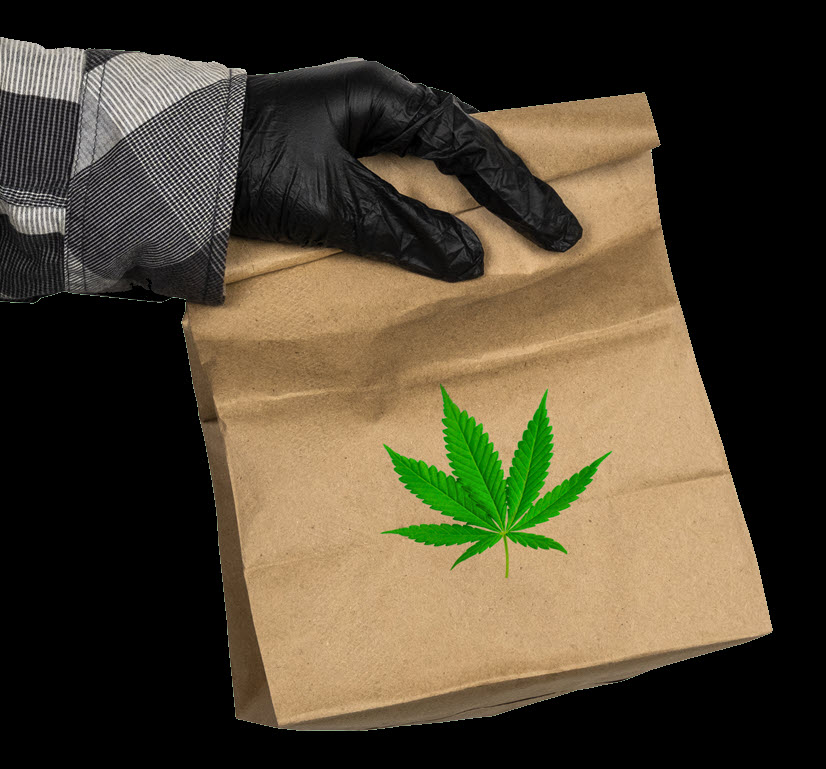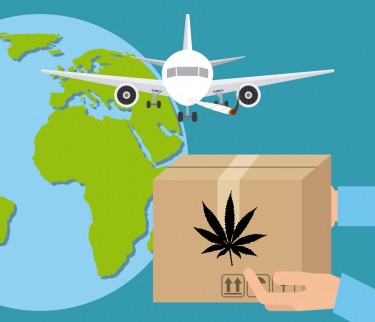
The international cannabis trade is booming!
Over 100kg of cannabis from Canada intercepted by Italian police
In a recent shipment from Canada to Italy, 108 kg of cannabis was hidden between animal absorbent mats. Police seized shipment from an organization apparently dealing with shipping and logistics in the Milan area earlier this week, according to local sources originally published by StratCann.
Police were called after workers noticed a cannabis odor emanating from a pallet of packages that had just arrived from Canada. Police investigated and discovered 200 vacuum-packed packages of marijuana in the shipment. Sender and recipient are the subject of current inquiries.
According to Reuters, while recreational marijuana use in moderation and medicinal purposes is legal in Italy, it is against the law to grow and sell the drug. Large quantities of marijuana from Canada have traveled to other countries in the past, so this is not a new occurrence.
A shipment of 57 piles of ceiling tiles that arrived in Hong Kong last month contained 34kg of methamphetamine and 38kg of marijuana. According to authorities, the drugs were hidden in the hollowed-out centers of the tiles. The arrest, which was valued at nearly $4 million, reportedly led Hong Kong and Canadian authorities to cooperate on an investigation.
An agreement between the Canada Border Services Agency and the Hong Kong Customs and Excise Agency was signed in 2019 to work together on a range of concerns, including cannabis smuggling. A few months before the deal, Hong Kong police had seen a 500 percent increase in drug seizures and blamed Canada for the surge in cannabis seizures following the implementation of federal legalization.
DRUG TRAFFICKING IN CANADA
Drug trafficking arrests are routinely reported in the Toronto-area media. Many suspects, copious amounts of drugs, mountains of cash, and tactical police raids are all components of headline-grabbing arrests. Even a single suspected trafficker can generate headlines like “More than a dozen counts in Greater Toronto Area Drug Trafficking Investigation.”
According to Statistics Canada’s latest incident-based crime statistics, criminal drug trafficking is pervasive throughout Canada, including Toronto, Ontario. According to statistics, over 14,000 Canadians were charged with drug trafficking offenses in 2021. Just over 6,100 of the total human trafficking charges were filed by Ontario police departments, including nearly 2,300 in the greater Toronto area. Cocaine-related crimes accounted for about 50% of all human trafficking-related charges, while crimes related to “other restricted narcotics and substances” accounted for about 19% of the total. Methamphetamines were the second most popular drug group at around 17%, followed by non-heroin opioids at 11% and heroin at around 3%.
DRUG TRAFFICKING FROM CANADA TO OTHER COUNTRIES
Cannabis is now more commonly produced and exported in Canada, as Canada has legalized the drug for both medicinal and recreational use. Unlike criminal cannabis producers who take advantage of lax rules to grow marijuana and export it to other countries, legal cannabis companies are designed to meet strict standards and only sell within Canada. Criminal gangs are now also involved in the trade, using Canadian ports to smuggle vast quantities of cannabis to other countries. Other nations, particularly those that haven’t legalized cannabis, are concerned about the surge in cannabis trafficking from Canada, which has led to calls for tougher laws and international cooperation to address the problem.
THE IMPACT OF DRUG TRAFFICKING ON SOCIETY
The negative impacts of drug trafficking on society are numerous and include rising crime rates, addiction and health problems. The seizure of 108 kg of marijuana is just one example of the ongoing fight against drug trafficking and its detrimental impact on communities. Because the demand for narcotics is so great, organized crime thrives, spawning violent crimes such as robbery, theft, and murder. Drug trafficking also contributes to the spread of infectious diseases and mental illness, as well as addiction and related health problems. Drug trafficking also contributes to social and economic problems such as homelessness, unemployment and poverty. Drug trafficking in general threatens the social and economic stability of communities and seriously endangers public health and safety.
THE CHALLENGES OF ENFORCEMENT OF DRUGS LAW ACROSS INTERNATIONAL BORDERS
Law enforcement agencies face significant obstacles in enforcing drug laws across borders. Prosecuting drug traffickers can be difficult due to the difficulty in tracing drug trafficking across borders and collecting evidence. To successfully intercept drug shipments, law enforcement agencies often rely on intelligence gathering and international coordination between agencies. Due to the complexity of coordinating border crossings and jurisdictions, drug regulations can be difficult to monitor. However, to avoid detection, traffickers employ cutting-edge strategies such as encryption and covert packaging, making the job of law enforcement officers even more difficult. Despite these obstacles, law enforcement agencies continue to develop new tactics and equipment to combat drug trafficking, such as B. State-of-the-art surveillance technology and improved cooperation with international authorities.
In addition to the difficulties of law enforcement, drug trafficking also raises wider social and political problems. For many years there has been a discussion about whether drug use and drug trafficking should be punishable; Some people argue that this is unnecessary because harm reduction and therapy are more important than punishment. Some believe that strict adherence to drug laws will prevent drug trafficking and other related crimes. As societies grapple with the effects of drug use and trafficking, drug policy discourse will become even more complex and diverse. Ultimately, effective solutions will require collaboration between law enforcement agencies, decision-makers and communities affected by drug problems.
FINAL EFFECT
Drug trafficking is still a major problem in Canada and around the world, with criminal groups finding new ways to avoid detection and transport drugs across borders. Drug trafficking has far-reaching effects, including rising crime rates, addiction, health problems, and social and economic instability. While law enforcement agencies face significant hurdles in enforcing drug prohibitions across international borders, cooperation and coordination between agencies can result in effective interceptions and arrests. To protect communities and improve public health and safety, continuous action to prevent drug trafficking is required.
ILLEGAL MARIJUANA SHIPMENTS, READ MORE…

SHIPPING WEED AROUND THE WORLD DESPITE UN DRUG TREATIES?

Post a comment: